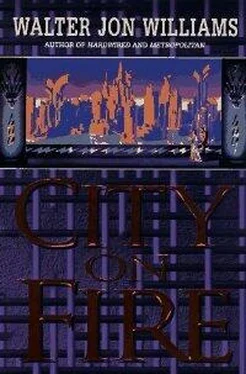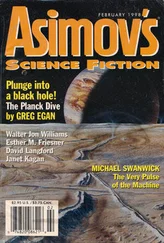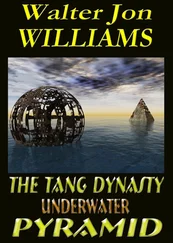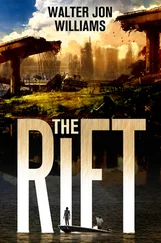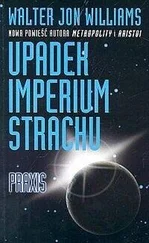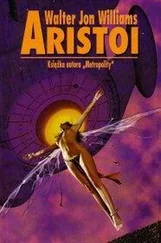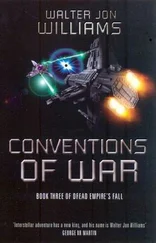Walter Williams - City on Fire
Здесь есть возможность читать онлайн «Walter Williams - City on Fire» весь текст электронной книги совершенно бесплатно (целиком полную версию без сокращений). В некоторых случаях можно слушать аудио, скачать через торрент в формате fb2 и присутствует краткое содержание. Год выпуска: 1997, ISBN: 1997, Издательство: HarperPrism, Жанр: Фантастика и фэнтези, на английском языке. Описание произведения, (предисловие) а так же отзывы посетителей доступны на портале библиотеки ЛибКат.
- Название:City on Fire
- Автор:
- Издательство:HarperPrism
- Жанр:
- Год:1997
- ISBN:0-06-105213-2
- Рейтинг книги:3 / 5. Голосов: 1
-
Избранное:Добавить в избранное
- Отзывы:
-
Ваша оценка:
- 60
- 1
- 2
- 3
- 4
- 5
City on Fire: краткое содержание, описание и аннотация
Предлагаем к чтению аннотацию, описание, краткое содержание или предисловие (зависит от того, что написал сам автор книги «City on Fire»). Если вы не нашли необходимую информацию о книге — напишите в комментариях, мы постараемся отыскать её.
City on Fire — читать онлайн бесплатно полную книгу (весь текст) целиком
Ниже представлен текст книги, разбитый по страницам. Система сохранения места последней прочитанной страницы, позволяет с удобством читать онлайн бесплатно книгу «City on Fire», без необходимости каждый раз заново искать на чём Вы остановились. Поставьте закладку, и сможете в любой момент перейти на страницу, на которой закончили чтение.
Интервал:
Закладка:
Aiah looks at him. It is the first hint of irony she has seen in him.
“I was the son of the boss,” he says, “so I got out. I was lucky.” He stands on tiptoe, points. “My cousin is the new boss, and lives there. We will visit him.”
Aiah’s courage quails at the thought. Ethemark’s large eyes turn to her.
“This place is illegal, of course. All the half-worlds are, but certain people are paid off, and others don’t care or find the people who live here useful… and besides there is a need for places like this, so they exist. But any of these people could be driven out of here at any time, and all these homes dispersed or destroyed by any official inclined to do so. The population has no rights in the matter.”
He looks up at Aiah, and urgency enters his voice. “I said that your patron and mine have no present cause to disagree. I bring you to this place to show you where my loyalties truly lie. If anyone strikes at these people, tries to cut them off from what little they have, then I will owe your people no loyalty. Do you understand?”
Aiah shrinks from a cold drizzle that falls from some invisible drain high overhead. The boss’s house, covered in scaffolds and with red lights dangling overhead, floats nearer.
“What of the bosses?” she asks. “These little gangsters you talk about, one of whom is your cousin. Are your loyalties to them?”
Ethemark’s thin lips draw back from his teeth, giving him a strange urgency. “Miss Aiah,” he says, “at this moment in time, the bosses are necessary. If these people were no longer driven to live here, the bosses would no longer exist. They would disappear of their own accord.”
Aiah lacks Ethemark’s optimism. She has never known gangsters to vanish of their own free will.
The boatman cuts the engine and the boat drifts up to a half-submerged landing. One of the children lashes the boat to an upright. From somewhere comes the surprising smell of coffee.
“This way.”
Ethemark reveals an unexpected agility as he springs from the boat, touches one boot to the half-submerged platform, then leaps to the rungs of a ladder that seems to be bolted together from bits of old pipe. Aiah is less graceful, and while Ethemark scurries up the ladder Aiah soaks her boots to the ankle as the platform sinks beneath her weight.
“Ethemark!” It’s a juvenile voice, but the sound comes from a mountainous shadow, dimly seen in the faint light on a catwalk above Aiah’s head.
“Hello, Craftig,” Ethemark says. “How’s the family?”
Craftig’s answer is expansive, enthusiastic, and full of digressions. Aiah climbs the improvised ladder to a narrow overhead catwalk that runs across several of the moored vessels. The half-world of Aground spreads out below her on either side like some strange half-lit blight spreading across the water. She can see grotesque faces flickering in the reflected light of gas stoves. The generator thuds at her ears, and the smell of fecal matter is overwhelming.
“Hi, lady,” the boy says.
Aiah’s attention snaps back to the two twisted. “Hello, Craftig,” she says.
Craftig, not having got his growth, is about a head shorter than Aiah, but he is built on such a massive scale that he must outweigh her by at least a factor of three.
“This is Miss Aiah,” Ethemark says. “She’s my boss.”
“Nice to meet you,” Craftig says.
“We need to see Sergeant Lamarath,” Ethemark says.
“Great! This way!”
Craftig turns and scurries back along the catwalk. He has a bad limp—one knee folds under him at every step—but that doesn’t seem to slow him down. Now that Aiah is closer, she can see that something’s gone very wrong with his twisted genetics. Bone masses seem to have grown abnormally, and gray lumps of bone protrude through the skin in some places. Aiah’s stomach turns over, and she clenches her teeth and marches herself deeper into Aground.
Ethemark and Aiah follow the boy down the platform, then along a swaying bridge made of scavenged cable. Below, Aiah can see faces turned up to watch her. She can’t tell whether they are curious or hostile, but the sea of glittering eyes gives her the shivers anyway.
“I apologize for the smell,” Ethemark says. “We have an agreement with the dolphins to keep the water clean. They provided us with the generator, and we power it with methane made from human waste. That way Aground gets electricity, the water doesn’t get fouled, and we can sell the residue for fertilizer, which is used to pay the people for bringing in their night soil.”
Aiah places her feet carefully on the swaying bridge. She’s incredulous at the thought that this water is considered clean. And the implications of Ethemark’s statement seize her attention.
“The dolphins? Do you—do the people here—deal with them on a regular basis?”
“Naturally. We have a number of issues in common—we are both exiles from the world above, and neither of us were high on the old government’s list of priorities. The dolphins have an interest in sanitation because they are susceptible to a wide range of human diseases, so they’ve made similar deals with most of the other half-worlds. I’ve heard it said that they are not a separate species at all, but humans adapted for an aquatic environment. Twisted genetics, just like ours.”
He turns, his unblinking eyes gazing at Aiah like spheres of polished black glass. “The dolphins turned against the Kere-maths because of the water situation. Did you know that?”
Aiah shakes her head. The bridge sways uneasily beneath her feet, and droplets of condensation spatter on her hat.
“The Keremaths allowed their waste disposal systems to deteriorate. Thousands of tons of waste were being dumped untreated into the water every day. The repair went out for bids, but there was the usual fiddling over the contracts, and the dumping went on for twelve years.” Fury sharpens Ethemark’s deep tones. “Once the fighting was over, Constantine sent in some military engineers to the waste plants, and they fixed the problem in two days. Two days!”
“Hey, Ethemark!” Craftig’s voice calls through the darkness. “Did you forget the way? It’s over here!”
Ethemark turns abruptly and steps off the swaying bridge onto another platform. Aiah follows, placing her feet carefully. The only route down is a ladder, then a pair of planks spanning the gap from one craft to another.
At the end of the journey is a barge with a building constructed on its rusting deck plates. It’s an assemblage of parts thrown together almost randomly: the superstructure of some other vessel; a picture window out of a streetfront display; a large trailer, wheels removed. The whole thing is decorated with long strands of decorative red lights, giving it a misplaced holiday air.
Aiah feels her spine stiffen as she nears the building: there are some stonefaces waiting here, scarred visages atop huge, muscular bodies, obvious bodyguards. An assortment of people sit waiting: a mother with children overflowing her lap, an elderly woman holding a scabrous-looking chicken in a cage, a young gray-skinned embryo reading a book in the darkness with his large goggle eyes. Petitioners, Aiah assumes, here to ask the big man for favors.
Craftig speaks to one of the guards, and then Ethemark, and the guards look at Aiah before one of them disappears into the structure. Aiah stands for a long, uncomfortable moment, hating every second of this gangster ritual, and then the guard returns and gestures for Ethemark and Aiah to enter.
“See you later, Miss Aiah!” Craftig calls.
Aiah stops, turns to the boy, forces a smile onto her face. “Nice to meet you, Craftig. Thanks for showing us the way.”
Читать дальшеИнтервал:
Закладка:
Похожие книги на «City on Fire»
Представляем Вашему вниманию похожие книги на «City on Fire» списком для выбора. Мы отобрали схожую по названию и смыслу литературу в надежде предоставить читателям больше вариантов отыскать новые, интересные, ещё непрочитанные произведения.
Обсуждение, отзывы о книге «City on Fire» и просто собственные мнения читателей. Оставьте ваши комментарии, напишите, что Вы думаете о произведении, его смысле или главных героях. Укажите что конкретно понравилось, а что нет, и почему Вы так считаете.
